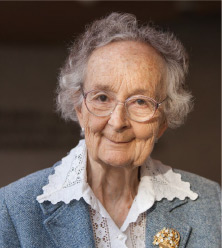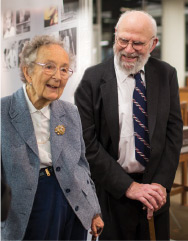
Error: No layouts found

Isabelle Rapin, M.D., who advanced our understanding of autism through her rigorous studies and who popularized the term “autism spectrum disorders,” died on May 24 at age 89. Dr. Rapin joined the Einstein faculty in 1958 and taught and conducted research at the College of Medicine for more than 50 years.
Her interest in autism stemmed from her study of communications disorders that impair children’s ability to function in the world. Although she officially retired in 2012, she was Skyping with colleagues and finishing a paper about congenital blindness and autism just days before her death.
In 2012, Einstein honored Dr. Rapin by creating the annual Isabelle Rapin Conference on Communication Disorders. Topics to date have included advances in research on Williams syndrome, dyslexia, Rett syndrome and tuberous sclerosis.

FASCINATED BY SCIENCE
Isabelle Martha Juliette Rapin was born on December 4, 1927, in Lausanne, Switzerland. When she began medical school in 1946 at the University of Lausanne, she was one of about a dozen women in a class of some 100 students.
In an autobiographical article published in the Journal of Child Neurology, she wrote, “By my first rotation, I noted that I lavished more effort on neurologic cases than others.” An experience in 1951 set the course for her career. “I spent 6 weeks in neurology at la Salpêtrière and another 6 at the Hôpital des Enfants Malades in Paris where I attended the . . . public consultations of Professor Stéphane Thieffry, my first encounter with a child neurologist,” she wrote in the article. “I came back from Paris with my mind made up: I was to become a neurologist for children.”
Dr. Rapin immigrated in 1953 to the United States, where her first job involved working in pediatrics at Bellevue Hospital in Manhattan. A year later, she began a residency at the New York Neurological Institute at Columbia-Presbyterian Hospital, and in 1958 she was hired by Saul Korey, M.D., Einstein’s founding chair of neurology.
The neurologist and author Oliver Sacks, M.D., was a close friend and colleague of Dr. Rapin’s and called her his “scientific conscience.” In his book On the Move: A Life, Dr. Sacks wrote: “Isabelle would never permit me, any more than she permitted herself, any loose, exaggerated, uncorroborated statements. ‘Give me the evidence,’ she always says.”
ON HAVING IT ALL
In her autobiographical article, Dr. Rapin had this advice for young women interested in entering her field: “Child neurology is a wonderful field, intellectually and personally, because of the families you will meet. In order to have it all, that is, be married, have children, and have a great job, you need a supportive and generous mate. Consider every patient a potential source of knowledge, pursue your interests vigorously, find a good mentor, enjoy what you do, and be lucky.”.
Dr. Rapin is survived by her husband, Harold Oaklander, Ph.D., and their four adult children and four grandchildren.